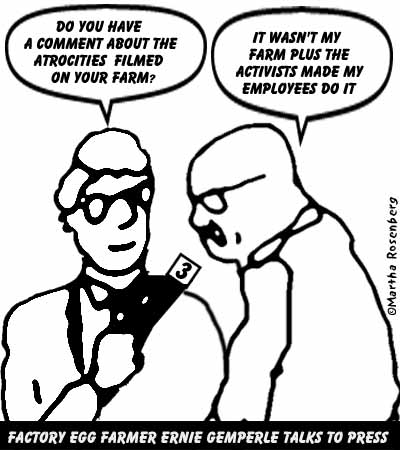The Boy Scouts of America Greater Yosemite Council commended his leadership in transforming “a small family farm model to the current computer driven egg-producing company.” The Stanislaus County Board of Supervisors inducted him into the Agriculture Hall of Fame. But according to an undercover video aired on TV stations this week, including CNN, the avuncular, civic-minded Ernie Gemperle operates a chamber of horrors for the two million chickens caged on his Turlock, CA-based Gemperle Enterprises farms.
The video, which includes workers gassing and stomping sick hens and carcasses pulled from live hen cages, was shot over a two month period earlier this year at Gemperle Enterprises egg farms in Delhi and Hilmar, CA by an unidentified, undercover investigator hired to repair cages and machines at the sites.
It was circulated by Chicago-based Mercy for Animals (MFA) a non-profit group credited with exposing abuses at the Raeford, NC-based turkey processor, House of Raeford in 2007 and Croton, OH-based Ohio Fresh Eggs in 2004.
Following a Sacramento press conference at which California State Sen. Carole Migden said, “I am horrified to see that farmers and workers would treat animals with such disregard,” Monrovia-based Trader Joe’s announced an “indefinite” ban of NuCal Foods, Inc. which distributes Gemperle eggs.
Ripons, CA-based NuCal Foods is the largest distributor of shell eggs in the western United States, also supplying Raley’s, SaveMart Supermarkets and the U.S. Department of Defense at over 200 commissaries, says Nathan Runkle, executive director of Mercy for Animals.
Raley’s spokeswoman Nicole Townsend told the Associated Press the chain plans to continue to carry all eggs from NuCal, but “does not condone any acts of cruelty to animals,”–as if there’s no correlation.
The video shows what amount to the entire life cycle of the modern caged laying hen from stuffing of the newly arrived pullets into file drawer sized cages to retrieving them months later for the kill cart gas chamber when they’re “spent,” barely recognizable as birds or being alive.
“There are multiple shots of moribund chickens with ailments ranging from broken limbs to abscessed cloacae to illness so severe the birds are unable to open their eyes or stand,” commented Santa Rosa veterinarian Dr. Christi Camlbor after viewing the video. “The presence of animals in such poor conditions without any apparent method to detect them or provide them with an instant death is extremely concerning.”
“It is unclear why personnel depicted in this video chose to subject birds to obvious pain and suffering when other means are available,” says Dr. Sara Shields, an animal behavior scientist and industry consultant. “Stepping on a bird or twisting her neck is absolutely NOT an acceptable method for killing a chicken. However, both of these methods are shown in the video. The hens were undoubtedly in acute pain and continued to suffer a protracted, slow death, as the video clearly shows they are not dead when left.”
In fact, sadistic killing games were a regular part of work at Gemperle Enterprises according to the MFA investigator. “Think I can kill it in just one hit?” he records in his diary a coworker with a six foot piece of PVC pipe asked him upon seeing a loose chicken on February 23, 2008.
When caught red-handed, factory farmers often charge investigators with permitting or facilitating animal cruelty by not going to authorities.
But twice in the past two years a different humane group, Farm Sanctuary, submitted similar videos to Merced County law enforcement authorities who did not investigate, bring charges or even respond to allegations.
“We are obviously not going to launch a prosecution based on unsubstantiated video,” District Attorney Larry Morse III told the Modesto Bee after the MFA expose. “If we have evidence of mistreatment of animals, it should be investigated by the Sheriff’s Department, and if found to be legitimate, then should be forwarded to our office.”
Nor can Gemperle Enterprises fall back on the standard the-tape-is-inauthentic defense because the video includes external and internal building markers and even images of Company president Steve Gemperle inside the sheds, says MFA. (So much for the we-didn’t-know defense.)
And, when given a chance to prove MFA’s video false by letting Sacramento KCRA 3 camera crews into the egg barns, Ernie Gemperle declined–on camera.
Working on an Ohio angle to the story, reporter Tom Brockman with NBC 4 in Columbus, OH encountered a similar news camera embargo at Ohio Fresh Eggs in Croton. “We were told making those arrangements usually take days for reasons like they must have enough biohazard suits on hand,” he said.
Not surprisingly, industry officials don’t want to discuss the video in light of the fact that Gemperle Enterprises held a “humane” certification from United Egg Producers, the trade group representing 85% of U.S. egg producers. Oops.
“It’s been very difficult to get anyone involved in the egg industry to watch the video and comment,” disclosed reporter Dan Noyes with ABC 7’s I-Team. “Not the state Department of Food and Agriculture, the poultry experts at UC Davis, and not even the county extension agents who work with the farms. We had to go all the way to the University of Maryland to speak with an expert in the Avian and Animal Sciences Department.”
Looking more like Jack Kevorkian than Farmer Jones, Ernie Gemperle told KCRA 3 reporters when the video broke it constituted an “invasion of privacy” and the birds are well cared for and treated “better every year.” He defended the gassing seen on the video as how you dispose of “sick birds,” sick apparently meaning “spent” and “unprofitable” since they are all gassed.
A few days later though Gemperle changed his mind and issued a press release saying “employees were coerced by the activist to engage in behavior that is against our high standards for hen welfare for the sole purpose of filming a sensational video.”











